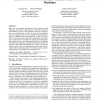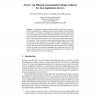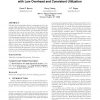117 search results - page 12 / 24 » Real-Time Garbage Collection for Java |
118
click to vote
VEE
2006
ACM
15 years 8 months ago
2006
ACM
Many new Java runtime optimizations report relatively small, single-digit performance improvements. On modern virtual and actual hardware, however, the performance impact of an op...
113
click to vote
IWMM
2010
Springer
15 years 6 months ago
2010
Springer
Concurrent and incremental collectors require barriers to ensure correct synchronisation between mutator and collector. The overheads imposed by particular barriers on particular ...
108
Voted
ECOOP
2007
Springer
15 years 6 months ago
2007
Springer
Abstract. A generational collection strategy utilizing a single nursery cannot efficiently manage objects in application servers due to variance in their lifespans. In this paper, ...
198
click to vote
POPL
2003
ACM
16 years 2 months ago
2003
ACM
Now that the use of garbage collection in languages like Java is becoming widely accepted due to the safety and software engineering benefits it provides, there is significant int...
134
click to vote
IWMM
1998
Springer
15 years 6 months ago
1998
Springer
Many high-level language compilers generate C code and then invoke a C compiler for code generation. To date, most of these compilers link the resulting code against a conservativ...



